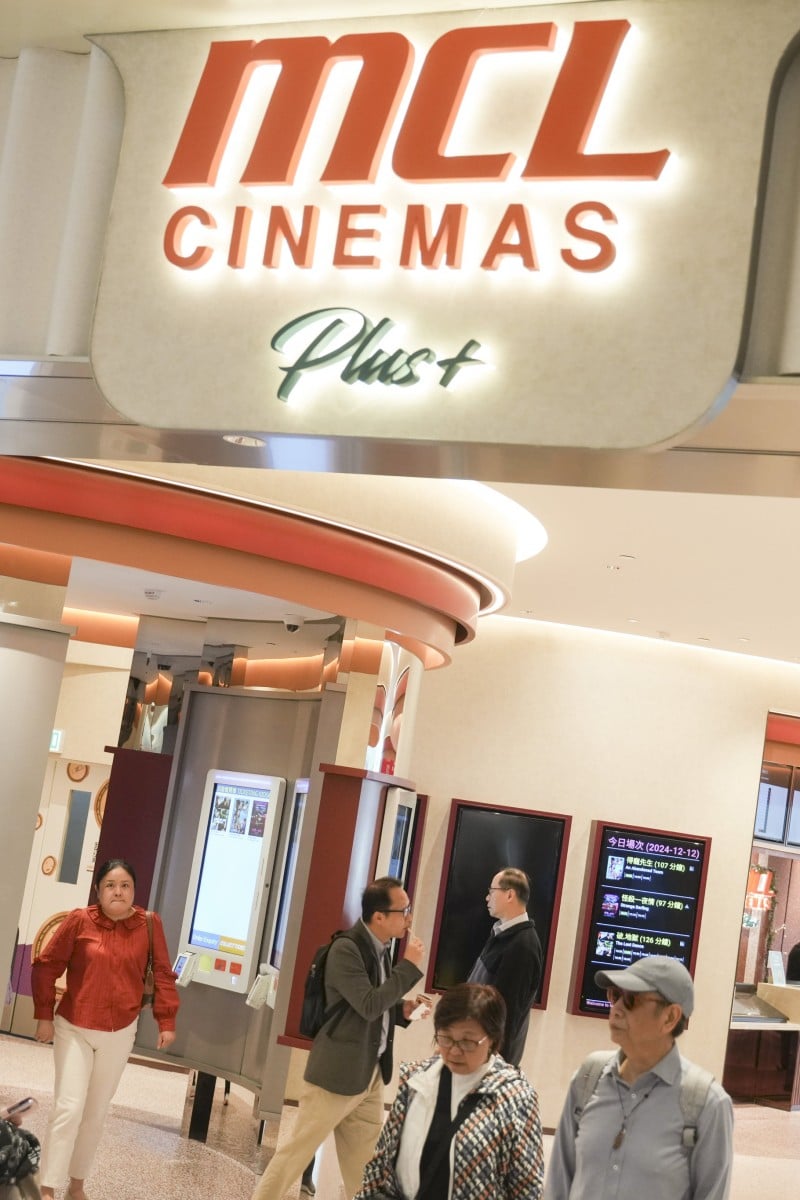
Deep Dive: Hong Kong’s cinemas struggle to survive as more people turn to streaming platforms
Though local hits like ‘The Last Dance’ and ‘Twilight of the Warriors: Walled In’ attracted crowds, many cinemas are still at risk of closing
 MCL Cinema Plus+ at the Plaza Hollywood shopping mall in Diamond Hill is one business that recently closed down. Photo: Sam Tsang
MCL Cinema Plus+ at the Plaza Hollywood shopping mall in Diamond Hill is one business that recently closed down. Photo: Sam TsangDeep Dive delves into hot issues in Hong Kong and mainland China. Our easy-to-read articles provide context to grasp what’s happening, while our questions help you craft informed responses. Check sample answers at the end of the page.
News: Why are Hong Kong cinemas closing despite recent box office success?
-
Two Hong Kong films broke records last year, bringing locals back to the city’s struggling cinemas
-
Covid-19 restrictions, streaming platforms have taken their toll on the industry
Two Hong Kong films broke records by surpassing HK$100 million (US$12.9 million) in box office takings last year. Although the hits The Last Dance and Twilight of the Warriors: Walled In brought in crowds, they did little to ease the woes of cinemas in the city.
From a peak of more than 125,000 seats in 112 cinemas in 1994, there are now under 40,000 seats in 56 cinemas, according to the Hong Kong Theatres Association.
The city’s cinemas took a beating during the Covid-19 pandemic. They had to close for about 200 days each year while still paying rent and salaries. This resulted in massive losses across the industry.
At the same time, streaming platforms such as Netflix and Disney+ have caught on. These services allow users to watch what they like, when they want, at home.
Cinema chain UA closed down during the pandemic in 2021 after 36 years in Hong Kong. It had six cinemas.
At least nine cinemas closed last year, including two each from the Golden Scene and MCL chains. Three more announced their closure in the first three months of 2025.
“Cinemas have to look at average revenue across the entire year, not just one or two films that do very well,” said Crucindo Hung Cho-sing, chairman of the Federation of Motion Film Producers of Hong Kong.
Deep Dive: Rising costs in Hong Kong means more people are buying second-hand, shopping abroad
The total box office takings of about HK$1.3 billion (US$167.5 million) was spread across nearly 300 screens. “Every cinema made a loss if we divide the revenue among them,” Hung said.
For the industry to break even, annual takings had to be at least HK$2 billion (US$257.6 million), Hung explained. “There is still a massive gap,” he added.
Hong Kong films are not the only source of revenue for cinemas in the city. They also screen films from mainland China and abroad.
US-made productions had the largest share of the market. However, according to Hung, receipts from American films dropped from about 75 per cent of the box office takings to around 40 per cent last year.
So, while Hong Kong films brought in slightly more money last year, that increase was more than offset by the decline in takings from US films. This means that last year was the worst for box office performance in years, he said.
Staff writers
Question prompts
1. Which of the following is true, according to News?
(1) Two Hong Kong films broke box office records last year.
(2) Cinema attendance increased during the Covid-19 pandemic.
(3) Streaming platforms are not popular in Hong Kong.
(4) American films have the largest market share in Hong Kong.
A. (1), (2) only
B. (2), (3) only
C. (1), (4) only
D. (2), (4) only
2. How many cinemas were there in Hong Kong in 1994 compared to now, and what does this say about the industry?
3. According to Crucindo Hung, why are Hong Kong cinemas facing challenges despite recent box office successes?
Graphic
1. What is being shown in the graphic? How does it reflect the information presented in News?
2. Using News, Glossary and your own knowledge, list TWO reasons why Hong Kong cinemas are struggling.
Issue: The role of Hong Kong cinemas in the world of streaming
-
Shifts after Covid-19 pandemic, travel to the mainland mean fewer Hongkongers are watching movies in the cinema
-
Decline in movie attendance reflects trends happening in other parts of the world
According to an insider, the rise of streaming platforms has changed how people in Hong Kong watch films, contributing to a decline in cinema revenue.
“Almost every family has an account for such platforms, and viewers weigh whether to visit a cinema or watch a film at home. This is one significant shift that came out of the pandemic,” said Gary Ng Cheuk-yan, a senior economist at Natixis Corporate and Investment Bank.
It did not help that more Hongkongers were also heading across the border to shop, eat and relax on the mainland, or travelling abroad, he added. Residents were simply not in the city, lowering the number of people who might go to the cinema.
Ng said filmmakers who were aware of streaming platforms’ impact on their box office takings had begun to respond.
For example, Disney used to let its films compete against each other in cinemas and on its streaming platform, Disney+.
Deep Dive: Hong Kong’s tourism blueprint aims to bring billions to the economy
“Now they’ve changed their strategy and do not upload every production to Disney+ right away, to ensure that some viewers see them in cinemas first,” Ng explained.
The cinema decline is not unique to Hong Kong. Mainland box office tracker Dengta Data said in January that 57 per cent of patrons went to the cinema only once last year, and overall attendance fell to 1.01 billion – a 22.3 per cent drop from the previous year.
In addition, a media report said Australia had about 460 cinemas last year, 41 fewer than in 2021.
Kenny Ng Kwok-kwan, an associate professor at Baptist University’s Academy of Film, said social media had helped retain some interest in cinema, alerting Hongkongers to films worth watching.
“Young people – including young couples and families – still go to the cinema, especially for popular and entertaining films, blockbusters and some local films with high box office takings,” he said.
He said older people seldom went to the cinema except to take advantage of early bird discounts.
“For the middle-aged, life’s pressures often mean there is no mood for entertainment and art,” he added.
Ng said the government could help strengthen the Hong Kong film market locally and internationally.
“The government should look to expand the overseas market, not just the mainland market. With higher box office takings and if our stars could go international, it would create a multiplier effect,” Ng said.
He added that Hong Kong films had a low international presence, and the Trade Development Council could help by encouraging producers to join festivals, even to show old Hong Kong films, to raise awareness of local productions.
Staff writers
Question prompts
1. Which of the following is true, according to Issue?
(1) More Hongkongers are watching movies in the cinema than ever.
(2) Disney delays releasing some films on Disney+ to encourage cinema attendance.
(3) Social media has helped people stay interested in movies.
(4) Older people are more likely to go to the cinema than younger ones.
A. (1), (4) only
B. (2), (3) only
C. (3), (4) only
D. (1), (2) only
2. According to Issue, how have streaming platforms changed the way people watch films? How is the industry responding to this shift?
3. List TWO local and global factors that have contributed to the decline in cinema attendance. What measures have experts suggested to support the industry in Hong Kong?
Photo
Question prompts
1. Using the information presented in News and Issue, why might Golden Harvest cinemas be offering special ticket prices?
2. How does the move reflect the trend of cinema closures in Hong Kong? Explain using News, Issue, Glossary and your own knowledge.
Glossary
box office: in a cinema, this is the spot where you can purchase movie tickets. It can also refer to the commercial success of a film, play, or actor in terms of audience size or money they earn.
The Last Dance: a 2024 drama set around Hong Kong’s funeral trade. It is the highest-grossing domestic film ever in Hong Kong, earning more than HK$122 million at the box office.
Twilight of the Warriors: Walled In: a Hong Kong martial arts action film set in the notorious Kowloon Walled City. It is the second highest-grossing domestic film of all time in Hong Kong and has received critical acclaim worldwide.
revenue: money an organisation receives from its normal business activities. It is not the same thing as profit, which represents what is left over after all expenses have been paid. A company can have high levels of revenue without earning any profit at all.
multiplier effect: how one positive change, like a successful local film, can lead to more benefits – such as higher cinema revenue, more job opportunities, and greater international recognition for the industry.
Sample answers
News
1. C
2. There were 112 cinemas in 1994 compared to 56 cinemas now.
3. According to Hung, although two local films performed well, box office revenue was still the lowest in 13 years at HK$1.34 billion, far short of the HK$2 billion needed to break even. Although these local films made more money, US films - which constitute a majority of those in cinemas - made less money, so overall revenue dropped.
Graphic
1. The graphic shows a cinema with empty seats, reflecting the problem of decreased cinema attendance outlined in News.
2. People are choosing to watch movies on streaming platforms like Netflix and Disney+ instead of going to the cinema. They also took a beating during the Covid-19 pandemic, when they had to close for about 200 days each year while still paying rent and salaries, resulting in massive losses across the industry.
Issue
1. B
2. Streaming platforms have significantly altered film consumption habits by offering on-demand access at home, leading many viewers to choose convenience over going to the cinema. This shift, accelerated by the pandemic, has contributed to a decline in cinema revenue. In response, filmmakers and companies like Disney have adjusted their strategies—Disney, for example, no longer uploads every film to its streaming platform right away, encouraging people to see the movie in the cinema.
3. Global factors like the rise of streaming platforms and pandemic-driven shifts in viewing habits have reduced cinema attendance. Locally, age-related differences and lifestyle pressures further impact turnout. Experts suggest delaying streaming releases, boosting local film production, expanding international markets, and increasing government support to raise the industry’s profile and sustain cinema culture.
Photo
1. It hopes to attract audiences by offering discounted tickets.
2. The move hopes to encourage people to go to the cinema so it can avoid closing down like many others have been forced to recently. Cinema chain UA closed during the pandemic in 2021 after 36 years in Hong Kong. It had six cinemas before it shut. At least nine cinemas closed last year, including two each from the Golden Scene and MCL chains. Three more announced their closure in the first three months of this year.